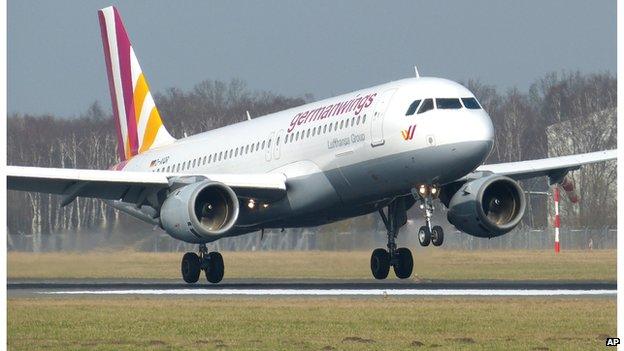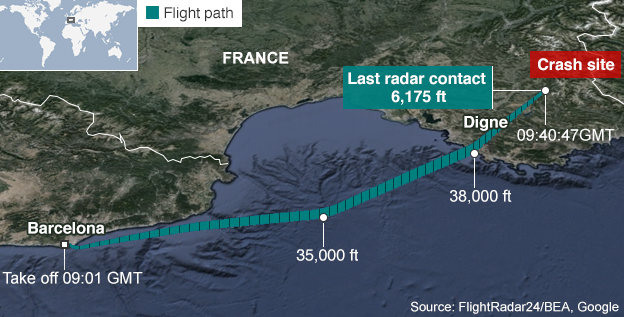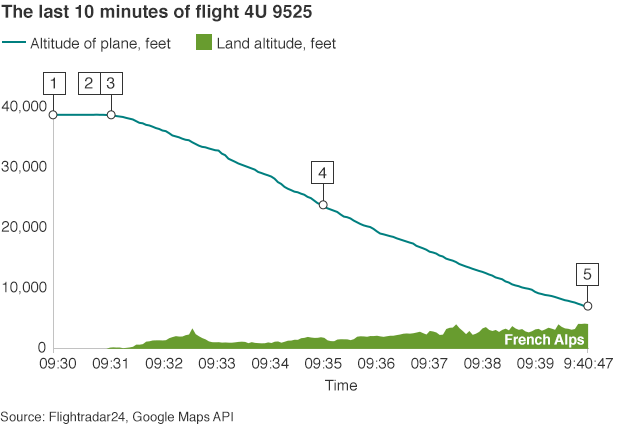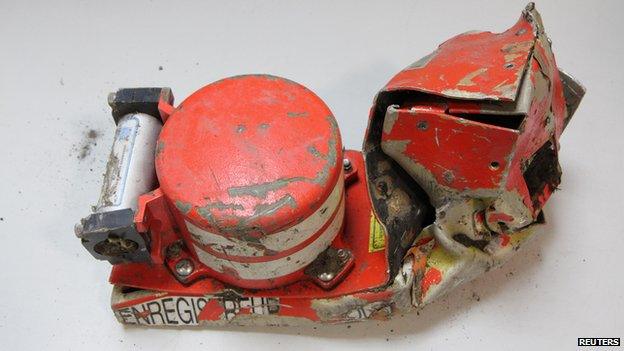Germanwings crash: What happened in the final 30 minutes
- Published

French accident investigators released their final report, external into Germanwings Flight 4U 9525, which crashed in the Alps in March 2015, about a year later.
Their evidence, obtained from the cockpit voice recorder and other information outlines in more detail how co-pilot Andreas Lubitz, 28, brought down the Airbus.
So how did this final half hour unfold?
Germanwings flight 4U 9525 took off from Barcelona Airport in Spain heading for Duesseldorf, Germany, with 150 people on board, at 09:00 GMT on 24 March.
The Airbus 320 began travelling over the sea towards France, taking about half an hour to climb to 38,000ft (11,600m).
It should have been a two-hour flight and, in the first 20 minutes, the pilots could be heard discussing the stop-over at Barcelona with a flight attendant.
At 09:30 the plane made its final contact with air traffic control - a routine message about permission to continue on its route. Everything seemed to be going as planned.
Shortly afterwards, the captain told the co-pilot he was leaving the cockpit and asked him to take over radio communications. The cockpit door is heard opening and closing on the recording.
Seconds later, shortly before 09:31, the selected altitude was changed from 38,000 ft to 100 ft and the plane began its descent.
At 09:33, the plane's speed increased. Air traffic control contacted the co-pilot - and continued to do so over the coming minutes - but received no answer.
A buzzer requesting access to the cockpit sounded at 09:34. Knocking and muffled voices asking for the door to be opened can be heard until the end of the recording.
At 09:39, "noises similar to violent blows on the cockpit door were recorded on five occasions" over the course of a minute. The flight crew of another plane also tried to make contact with the cockpit by radio around this time.
In the next minute - 93 seconds before impact - "low amplitude inputs" on the co-pilot's flight controls were recorded. But the level of movement was too low to disengage the autopilot, so the input made no change to the flight path.
The "Terrain, Terrain, Pull Up, Pull up" warning was triggered at 09:40: 41 and it continues until the end of the recording at 09:41:06.

French prosecutor Brice Robin gave details of events on board the Airbus when he briefed journalists after the cockpit voice recorder was analysed in the days after the crash.
During the first 20 minutes of the flight, he said, the co-pilot's responses were courteous but he became "curt" when the captain began the mid-flight briefing on the planned landing.
It was shortly after this that the captain left the cockpit, probably to go to the toilet, and within seconds Lubitz had altered the flight monitoring system to send the aircraft into descent.
"This action on the altitude controls can only be deliberate," said Mr Robin.


1. 09:30 - The plane makes final contact with air traffic control
2. 9:30:55 - Autopilot is manually changed from 38,000ft to 100ft
3. 9:31 - The aircraft begins its descent above the French coast
4. From 09:33 - Air traffic controllers try to contact the pilots, with no response
5. 09:40:47 - Last radar position of the plane registered at 6,175ft, just 2,000ft above ground
6 09:41:06 - Cockpit recording ends at the moment of collision

In the 10 minutes it took for the plane to plummet through the sky, Lubitz did not say a word and his breathing remained normal - despite repeated attempts by crew members and air traffic control to get him to respond.
The Airbus descended at a rate of about 3-4,000ft per minute. The last radar contact, external was at 09.40:47 GMT at 6,175ft.
During the very last moment of the recording passengers can be heard screaming. Mr Robin said he believed they were unaware of what was happening in the cockpit up until this point.
The plane hit the mountain at 700km/h (430mph) an hour. "Death was instant," he added.
